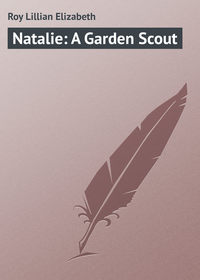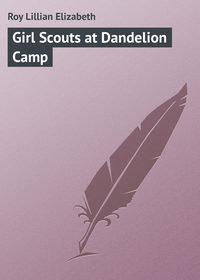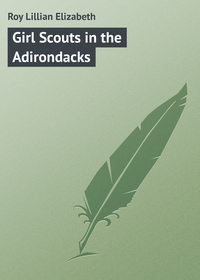 полная версия
полная версияThe Woodcraft Girls at Camp
"What do you mean?" asked Zan, puzzled.
"Wouldn't you have screamed and shaken it off, had a snake slid down on your hand?" queried Elena, amazed.
"If I felt startled, I doubtless would, but I would also have applied 'ready help' the moment I felt as ill over the incident as you seemed to be. As it was, not one of you appreciated the circumstances to help, so I had to step in."
"But, Miss Miller, you didn't do a thing!" exclaimed Jane.
"No? I made Elena, as well as all of you, think of something entirely foreign to the snake. By rousing your interest in another object, you unconsciously overcame the nausea, and later, I gradually drew your thoughts back to the very object that seemed to cause your illness, but in what a different frame of mind you examined the idea the second time. Well, girls, after all is said and done, it gets down to using our 'thinking machine more' does it not?" laughed the Guide.
"I guess you're right again – you may go to the head of the class," declared Zan.
"Do you know, girls, if I was President of this land I would have a law made that would make it imperative for every man, woman, and child to think! First of all, to think of what God means to us. Second, to think of what life means. Third, what does brotherhood really mean. Fourth, and all, inclusive, to think more of what can be done to improve the child! The child who will be the future citizen – a father or mother of future generations! Oh, I tell you, it will take thinking to lift the curse of the world, and then when one has thought deeply, to put into execution the good things that came to one in deep thinking!"
The girls smiled at what they considered Miss Miller's hobby, but they also admired her vastly for such thoughts.
While the talk drifted into other channels, Jane and Elena sought for and found some beautiful butterflies which they placed carefully in the boxes. As they turned to go back to their companions, Elena had an inspiration.
"Jane, you know it is Miss Miller's birthday the end of this month – what do you say to our making her a lovely tray with some of our best butterflies?"
"Tray? How would you make it?" wondered Jane.
"Why, we can send in to one of the department stores and buy the wooden frame with the glass and back ready-made. By grouping grasses and butterflies artistically on the cotton under the glass, and screwing the back on again, we would have a beauty!"
"Sure! That'll be fine, Elena! And why can't we try for a coup at the same time?"
So the girls decided to write that night and send for the tray, keeping the whole plan a secret from the others.
Just before the two hunters rejoined the others, a sudden peal of thunder startled every one. Miss Miller looked at the sky with apprehension in her eyes.
"Dear me, it is black as ink over Baldy and those two girls haven't come back yet!" cried she.
"It's surely coming up fast – when a storm comes in that direction, it's generally a hummer, too!" said Zan.
The sun, which had been shining brilliantly, now was partially obscured by the scudding clouds, and Miss Miller was about to shout for the missing girls when they appeared running through the bushes.
"We're too far from camp to make it in time, Miss Miller, and there's no other shelter near, is there?" called Jane.
"Oh, yes! I forgot to tell you what I found on my trail here," replied Zan, hurriedly. "Bob and Fiji discovered a cave last summer but they would never take me there. I tried to locate it but failed. On my way through the woods I accidentally found the great opening under the rock and stopped a moment to investigate. It will easily shelter every one of us!"
"All right, Zan – lead on quickly!" ordered the Guide.
The woods became as dark as evening while the peals of thunder crashed down and forks of lightning shot about the girls as they ran single file along the faint trail made by Zan.
"Dear me, Zan, I felt a drop! We will be deluged if you have much farther to take us!" cried Miss Miller.
"We're almost there – keep up your courage and win a coup!" laughed Zan, trying to cheer the others.
Then after a few more turns in and about the giant trees, she cried, "Here it is – tickets, please! Have them ready!"
It took but a minute for the others to fly after the leader into the dark interior of the cave. It was made by some huge rocks leaning against each other with tree-trunks to brace them from rolling down when the earth had been washed away from underneath. Situated in the side of the steep cleft of the ravine, with the opening toward the valley, it proved an admirable refuge.
After every one had assured herself that there was no immediate danger of the whole side crashing in upon them, Zan explained how the boys used to play Indians and camp out on fine nights. They had a few plates and pans on a narrow ledge in the cave, and some hemlock greens furnished a bed.
"How far from camp is the cave?" asked the Guide.
"Oh, about half a mile! We can follow down the ravine and get to our camp without trouble when it clears off," said Zan.
The rain swept down the mountain-side in torrents, while livid fire flashed in at the mouth of the cave accompanied by crash upon crash of deafening thunder. Miss Miller saw that a few of the girls were timid and looked fearfully about at the rock-ribbed walls of the cave to see if they were still in place.
"Don't you girls love to hear thunder roll and crack forth like the sound of cannon?"
"You really don't mean that you like thunder, Miss Miller?" gasped Elena.
"Why, yes, don't you? I think the privilege of watching lightning is one to be taken advantage of every time it is offered."
"But it is so dangerous! Suppose you were struck?"
"I know that the Great Spirit governs our destinies and I have no more to fear from a streak of lightning, if I am sensible, than I would have from yonder tall pine," said the Guide.
"But that pine is dangerous, too, in a storm!" said Elena.
"Then let's say, for a figure of speech, my bathtub at home. That I am as safe out there as at home."
"Oh, well, that's different. Every one knows a bathtub is perfectly safe, while lightning isn't," declared Jane.
"I see! Then it resolves itself into familiarity with the things you know about – and the danger of lightning is in its elusiveness at being studied and not in its power?" laughed Miss Miller, pleased at the way the girls walked in the trap.
"Mother always closes the doors and windows during a storm and won't let me sit on the porch, either. Why is that?" asked Elena, while the other girls forgot their fear in the interesting discussion under way.
"Some people say that a place might be struck unless tightly closed. I have even heard of folks that refused to have a lamp or light lighted during a storm, for fear the lightning would follow the path of light. But that is sheer nonsense. The only thing that might occur from wide-opened doors and windows is the strong current of wind that would tear along the floor if the draft was strong enough. This might conduct the lightning, especially if the rain blew in with the wind, for water is a great conductor of electricity. Sometimes, the clouds hang very low and the dart might possibly follow the line of least resistance. The notion that it will follow in the pathway of a light, is on the face of it an absurdity, for electricity itself is so much brighter than a pale shaft from a lamp or gas-jet can be, that it would never see the latter. Then, too, it would be allowing electricity to have intelligence to see a pathway of light, and that would be paganism. All intelligence comes from God, the Spirit, and no current of force, or object of material sense can rob Spirit of its prerogative. When we sift out many fears we find them actually based on old superstitions that have in some way been handed down since the days before the Christian Era."
"Miss Miller, why is it that a barn is more often struck than a house in town?" asked Jane, after a short silence.
"I am glad you thought of that, because it is interesting. It is a positive fact that very few accidents by lightning are recorded in large towns or cities. Not because there are no tall buildings or spires for the bolt to follow, but for some unknown reason lightning does not touch thickly populated places but seeks out solitary objects in the country, or on mountains and plains. Probably the farmers know this and that is why almost every dwelling in the country has a lightning-rod at the corners of the roof. Too, I have often thought that the chemicals generated by the cattle that stand in a barn have much to do with attracting electricity. I have even compared cases and find that a barn where the cows or horses are present, is struck and a vacant barn that has not been in use for a time, is left intact."
"Maybe you can tell us why pine trees are struck when the other trees are left without a mark? I have seen pine trees torn and splintered – ten to one of other trees," said Zan.
"Generally, a pine tree grows up straight and tall above its fellows about it. A pine having rosin in its sap should prove a non-conductor for the shaft, so I should say that the cause of its often being a victim to lightning must come from the fact that its spire pierces the low-hanging clouds passing over it and thus letting the electricity out to follow the object that entered the proscribed place. The higher on a mountain-side the pine grows, the oftener you will find one shattered. But I have noticed that other tall trees growing on high places, are as often struck, if the pine is not as tall as the companion trees."
"Miss Miller, who thought of the lightning-rod?" asked Zan.
"Why, my dear, don't you know? I thought every grammar school child remembered our good old Benjamin Franklin for that! He it was who brought it down into subjection for mortals to use. Before that time, people actually believed that God sent it for a warning. In these days, the man we call the Wizard of Electricity, Thomas Edison, has been able to harness it for practical purposes to lighten labour and extend the luxuries of living to mankind."
"I suppose we will experiment some day, and find out that lightning is no more dangerous than the rain-drops," ventured Hilda.
"It doesn't appear to be imminent though!" laughed Jane.
"What makes lightning, Miss Miller?" asked Elena.
"It is caused by a sudden discharge of atmospheric electricity. The identity of lightning was discovered by our Benjamin Franklin in America and Romas in France. There are several kinds of lightning, forked lightning being the dangerous kind. Heat lightning is seen in the skies at night after an unusually hot day. Sheet lightning spreads over a great surface and is of various colours. Chain lightning is swift, in long rippling lines looking like links of a chain. Globular lightning is a ball of fire and travels slower than the former kinds."
The girls were intensely interested in the teacher's explanations, but the rain was ceasing and the thunder sounded farther off.
"Some day we will take up the subject of electricity and look thoroughly into its claims. When you find out more about it you will lose much of your dread of it. The same plan might be adopted by Elena and the snakes. The more she knows about reptiles the less she will fear them, and the more interesting they become. You will look upon them as the living creature formed by the Creator. Then, you will unconsciously extend to them the admiration due them for their various ways of doing good to the earth upon which they live."
"Ugg! Who could ever admire a snake! After the way that slippery thing felt when I had a grip on it! I shall never want to hold one again," said Elena, shuddering.
"That is why I mentioned it again. If you girls had ever studied that form of life you would be surprised how beautiful and interesting snakes are. Maybe we will find time to catch a few specimens and watch them in captivity. I brought a splendid magnifying glass with me, and several pads for taking down notes. We can rig up a small shack and construct some furniture for it; it will be our scientific bureau where all our insects and other interesting data can be prepared and kept."
"Your plan sounds awfully jolly, if you don't make us catch the snakes!" said Elena.
"When it comes to providing the specimen we will take turns," replied the teacher.
The shower passed over as quickly as it had arisen, so the Band decided to start for Camp. The ground had been very dry and the rain soaked in rapidly, leaving the surface comparatively dry.
"I wonder if Nita was frightened at the shower?" said Zan, as they followed her down the trail.
"I'd rather have had company on that Bluff – but it is her own fault," said Hilda.
"Oh, girls, see the rainbow – isn't it a beauty!" exclaimed Miss Miller at this point.
The girls all stopped and admired the wonderful hues in the bow and Jane asked, "What makes a rainbow, Miss Miller?"
"Look, girls! There's another one – right near the other!" cried Zan, pointing.
"There usually are two, according to the brilliancy with which the sun reflects upon the opposite clouds when they are resolved into rain. Look at those two carefully! See the lower one is brighter than the second one. Also look quickly before it fades and see that the colours are reversed in their order; and in one, red is the highest colour, while violet is strongest in the second."
The girls stood straining their eyes to see things they had not thought of before. Miss Miller waited a moment to give them time to verify her statements, then she said, "Every rainbow has seven arcs presenting the seven colours of the solar spectrum. Sometimes the moon will produce rainbows but they are of very pale colouring. I could tell you all about the degrees and rays that go to elucidate facts about a rainbow, but you would only be in a maze when I was through, so I will tell you the simple fact of causation, then some other time we might go into the subject from a scientific basis.
"A rainbow is produced by the decomposition of the white light of the sun when it passes into the rain-drops, then reflecting from their inside face; or when solar light passes into drops of water under a certain angle.
"When we are placed at a certain angle on the earth, we look up at the spot where the rainbow is said to be, and the sun shining opposite it produces on the retina the sensation of colours. You never see a rainbow at high noon, yet the rays of the sun are intense enough. But there is no reflection at noon, upon clouds that you can see. There may be a rainbow at that time somewhere in the clouds, but you can't see it.
"The geysers in the National Park out West produce the same phenomenon, but in not such brilliant colourings. Sometimes, a double rainbow appears over Niagara Falls, and on almost any clear day you can see one large rainbow."
The girls listened to the interesting explanation while following the Guide down through the ravine. As they neared the Bluff, the sun began shining again in unclouded brightness, and only the drops of water on leaves and rocks told one of the shower.
Arrived at camp, everything was found to be in good condition, the tents having shed water beautifully; the Guide's selection of site proved wise inasmuch as the rain drained away from all sides of the spot where the tents stood.
Zan ran to her tent to see if Nita was sleeping. But no one was there. She came out again and looked at Miss Miller in astonishment. The Guide expected to hear that Nita had gone to bed to hide her ears from the thunder, and was surprised when Zan told her that Nita was not to be seen.
"She took refuge with Sherwoods' when the first peal of thunder sounded," said Miss Miller.
"I'll run down and let her know we are back. If she wishes to join us, all right, but I won't coax her to," whispered Zan, and the Guide nodded her approval.
But Zan came back alone after a long interval. She expressed concern in her face when Miss Miller asked about Nita.
"Mrs. Sherwood said she saw one of the girls coming down her foot-path with my mother's purple sun-shade. She was surprised and watched her go along the road that leads to the Big Bridge."
"There, now! That is where I saw that purple parasol! I sat on top of Baldy while waiting for you girls and as I looked at the valley view I spied a tiny form walking along the road with a dash of purple over her head. I sat wondering where I had seen a purple sun-shade – it seemed quite recently. But now I remember you carried one from the house when you brought some of the luxuries," said Miss Miller.
"How far is the Big Bridge, Zan?" asked Jane.
"Let's walk down there and meet Nita," suggested Hilda.
"Oh, the Big Bridge is at the extreme end of the farm and divides Hamilton's stock-farm from ours. If Nita walked as far as that, she would naturally seek shelter at Hamilton's. And Mr. Hamilton would send her here in a machine, or let one of his hostlers drive her back. Nita wouldn't walk back – it's too far for her," said Zan.
"Well, then, as the afternoon is far spent, what do you girls say to our daily swim? We can't start a lesson on gardening to-day, and I don't believe that any of us want to sew until we are satiated with farm-life and country sights," ventured the Guide.
"We'll all vote for a swim – the rain has swollen the creek so that the Falls will make lots of fun for us in the pool," cried Zan, delightedly.
"That's so! I never thought of that!" exclaimed Hilda.
"Hurry up, get undressed!" ordered Zan.
"Will the pool be perfectly safe if it is deeper?" Elena asked timidly.
"Safe as ever – nothing is safe unless you master it!" added Miss Miller, going to her tent to don her bathing-suit.
"We never thought to write for bathing-suits! We'll have to wear our union suits again," called Zan, as she entered her tent.
"I remembered while I was cooking supper last night and I intended drawing your attention to the matter again without directly reminding you, but Nita's actions caused the subject to fade away. This morning I recalled it again while I was washing, then I forgot again," admitted the Guide.
"I'll just hang a note on my tent-flap – then I'll sure remember to write when I get in," declared Zan.
The bath that day was enjoyed by all, and Elena almost overcame her timidity of the water. Hilda found she would float naturally if she relaxed the tension of her fear thought and let herself go in the water. It was a fine sensation – finding the water would buoy her upon its face.
After the girls had dressed and Miss Miller planned for supper, they wondered where Nita could be! She should have been back if Hamilton's expected to drive her over.
"Zan, if these neighbours have a telephone, can you go to Bill's house and 'phone?" asked Miss Miller, unwilling to admit that she was worried over the girl's absence.
"Bill's wire doesn't connect with anything but our house, but I will run there and get Hamilton's and find out where Nita is," said Zan, jumping up.
"Jane will go with you for company's sake," said Miss Miller.
Evidently, the information Zan heard on the telephone was of a most uncomfortable kind, for she hurried back to the Bluff without speaking of it to Jane, who was supposed to be with her for company's sake.
"Miss Miller, please come over here a moment!" said Zan. Her voice denoted concentrated anger and annoyance.
The other girls plied Jane with questions, but she could say nothing, as Zan had not confided in her.
"Miss Miller, Mr. Hamilton himself answered the call, and I told him who I was and what we were doing down here.
"He said he was glad we were down; Daddy wrote him about our camp, and said he was to drop in now and then and see if we needed anything he could supply.
"I told him no, that we were doing fine, but that one of our girls must have lost herself – was she at his house?
"He didn't speak at once, then he said, 'Did she have a purple parasol like your mother's last summer?'
"'Yes, yes, that's Nita!' I cried. 'Can you bring her over – she isn't accustomed to walking very much?' And, Miss Miller, what do you think he told me?"
Zan was so angry that she almost cried as she spoke.
The Guide soothed her wisely, and said, "Go on, Zan, I am most anxious to hear the rest."
"Mr. Hamilton drove to the next town's freight station to-day to get some dog crates and he says he passed a young fellow on the road who sat in a dog-cart leaning over the side talking to a girl with a purple parasol. He says the fellow is a Military School cadet, of about sixteen, who spends his summers at his grandmother's summer place, several miles farther on from the Hamilton place. Mr. Hamilton did not wait to see what the two finally did, but he did not see either of them on his drive back from town."
Miss Miller was stunned. She stood perfectly still for a time, then said, "Zan, have you ever known Nita to show any preference for boys' company?"
"Oh, yes. And, Miss Miller, she often said to me, what a lucky girl Jane was to have a chance to see so many nice fellows! Then, when she comes to my house, she always acts so silly when Fiji is about. He gets simply disgusted with her ninny airs and foolish things she does to attract his attention!"
"Humph! I see!" murmured the Guide, but she did not explain to Zan what it was she saw.
The two rejoined the girls and supper preparations continued in silence. Miss Miller had almost decided to send out an alarm by Mr. Hamilton when she saw Nita coming up the slope.
"Oh, hello, girls! Anybody get wet?" called she, as she came near enough to be heard.
Although the three other girls knew nothing of Nita's escapade, they felt that she had misbehaved in some way.
"Nita, can you explain satisfactorily where you have been all this time – and not have been caught in the rain?" asked the Guide, sternly.
"Oh, I had a nice time! Better than if I had gone mountain-climbing, I guess. I'm quite old enough to take care of myself, and, you see, I am safe and sound!" laughed she, with a hint of confusion.
"I see more than you give me credit for! You will get a pencil and pad at once and write to your mother, exactly where you went and what you did this afternoon."
"What difference will it make to mother? She isn't down here to take care of me?" replied Nita, impudently.
"Because she is your guardian by law and she must hear what you have to say," said Miss Miller.
"But she placed me in your care!" exulted Nita, triumphantly.
"Very well then, come with me and I will hear you – later I will see what is to be done," came unexpectedly from the Guide.
Nita frowned, but having trapped herself, she could not retreat by saying that Miss Miller had no right to question her.
At first the stubborn girl would not speak a word, so Miss Miller went over to her trunk and began unlocking it.
When she found that she must confess or go home, she told, little by little, about the afternoon's experience.
Finally, Miss Miller heard all she needed to know. Nita had walked along the road past Hamilton's place until a young man in a fine dog-cart came by. He mistook her for a dear friend in the city and stopped to invite her for a ride. When Nita explained that she was not the friend, he was very charming indeed, and wanted to drive her back to the camp. She demurred at first, but the shower threatened and he said she must get in and permit him to take her to his house which was nearby, until the rain was over. The house was much farther than Nita dreamed, and they just got under shelter of the wagon-shed in time. She did not go to the house, as the downpour prevented them. As soon as the shower was over they started back, but Mr. Everton lost the way and took the wrong turn. That was what delayed them so long.
"Nita, you will write and tell your mother everything you told me just now, and anything you have forgotten to say. Will you allow me to read the letter before you close it, please, as it must be plainly explained to her. If she wishes you to come home, all right; but if you remain here, it will be on a very different basis than heretofore. If you do not write, I will, and I will not interpret your act as kindly as you may do for yourself!"









